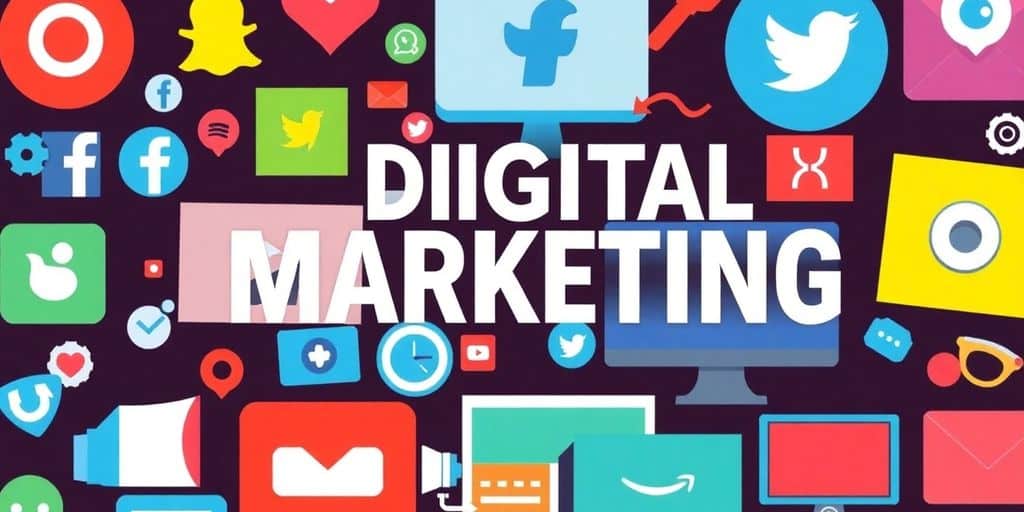In the rapidly changing world of online marketing, having a solid digital marketing strategy is crucial for any business aiming for success. This article explores the essential components of an effective digital marketing strategy, guiding you through the steps to create and implement a plan that aligns with your business goals and resonates with your audience. Understanding digital marketing strategy essentials involves recognizing the importance of key components such as audience targeting, content creation, and performance analysis. By focusing on these essentials, businesses can tailor their campaigns to meet specific objectives and engage effectively with their target demographic. Ultimately, a well-crafted digital marketing strategy serves not only to elevate brand visibility but also to drive measurable results.
Key Takeaways
- A clear digital marketing strategy acts like a roadmap, guiding your business towards its goals.
- Understanding your audience is essential; knowing who they are helps tailor your marketing efforts effectively.
- Utilising the right digital channels is key to reaching your target audience and maximising engagement.
- Regularly reviewing and adjusting your strategy ensures it remains effective in a changing digital landscape.
- Successful digital marketing combines creativity with data-driven decisions for optimal results.
Understanding the Core of Digital Marketing Strategy
Defining Digital Marketing Strategy
A digital marketing strategy is like a roadmap for your business. It helps you decide how to use online tools to reach your goals. This strategy includes various channels such as social media, email, and your website. Without a clear plan, you might waste time and money on things that don’t work.
Importance of a Well-Structured Plan
Having a well-structured plan is crucial for success. Here are some key reasons why:
- Guides your actions: A clear strategy helps you know what to do next.
- Saves resources: It prevents wasting time and money on ineffective methods.
- Measures success: You can track your progress and see what works.
Aligning Strategy with Business Goals
To be effective, your digital marketing strategy must align with your business goals. Here’s how:
- Identify your main goals: What do you want to achieve?
- Choose the right tactics: Pick methods that support your goals.
- Review and adjust: Regularly check if your strategy is working and make changes if needed.
A successful digital marketing strategy is not just about using the latest trends; it’s about finding what works best for your business and sticking to it.
In summary, understanding the core of digital marketing strategy is essential for any business aiming for success in the digital world. By defining your strategy, recognising its importance, and aligning it with your goals, you set a strong foundation for growth.
Crafting a Tailored Digital Marketing Approach
Identifying Your Target Audience
Understanding who your audience is crucial for success. Here are some steps to identify them:
- Conduct Surveys: Ask potential customers about their preferences.
- Analyse Competitors: Look at who your competitors are targeting.
- Use Analytics Tools: Leverage tools to gather data on user behaviour.
Choosing the Right Digital Channels
Selecting the right channels can make a big difference. Consider these options:
- Social Media: Platforms like Facebook and Instagram can reach a wide audience.
- Email Marketing: A direct way to communicate with your audience.
- SEO: Helps your website appear in search results, attracting organic traffic.
Balancing Innovation with Proven Tactics
It’s important to mix new ideas with strategies that have worked before. Here’s how:
- Experiment with New Trends: Try out fresh tactics that align with your goals.
- Stick to What Works: If a strategy is effective, continue to use it.
- Evaluate Regularly: Use the 80/20 rule to focus on the most effective strategies.
Crafting tailored digital marketing strategies for success means aligning precisely with your business objectives, ensuring every digital interaction counts.
By following these steps, you can create a digital marketing approach that not only reaches your audience but also resonates with them, leading to greater success.
Implementing Your Strategy Effectively
Building a Competent Team
To successfully implement your digital marketing strategy, having the right team is crucial. You can choose from several options:
- Freelancers: Great for specific tasks, like graphic design or content writing.
- Internal Team: Offers consistency and a deeper understanding of your brand.
- Digital Marketing Agency: Provides a wide range of skills and resources, acting like a well-rounded team ready for any challenge.
Utilising Technology and Tools
Using the right tools can make a big difference in your strategy’s success. Here are some essential tools to consider:
- Analytics Software: Helps track performance and understand audience behaviour.
- Social Media Management Tools: Streamlines posting and engagement across platforms.
- Email Marketing Platforms: Facilitates effective communication with your audience.
Monitoring and Adjusting Tactics
Digital marketing is always changing, so it’s important to stay flexible. Regularly check your strategy’s performance and be ready to make adjustments. Here’s how:
- Set Key Performance Indicators (KPIs): Measure success with clear goals.
- Use Analytics: Regularly review data to see what’s working and what isn’t.
- Be Ready to Adapt: If something isn’t working, don’t hesitate to change your approach.
Remember, a digital marketing strategy is a plan for using online channels to establish an internet presence and achieve specific marketing objectives. Keeping your strategy fresh and adaptable is key to long-term success.
Maximising Content Marketing for Success
Creating Engaging and Relevant Content
To truly connect with your audience, it’s essential to create content that is both engaging and relevant. This means understanding what your audience cares about and providing them with information that meets their needs. Here are some tips to achieve this:
- Know your audience: Research their interests and pain points.
- Use clear language: Avoid jargon and keep it simple.
- Tell a story: Make your content relatable and memorable.
Leveraging SEO for Better Reach
Search Engine Optimisation (SEO) is crucial for increasing your content’s visibility. By optimising your content, you can attract more visitors to your site. Here are some key strategies:
- Use keywords: Identify and incorporate relevant keywords.
- Create quality backlinks: Link to reputable sources and encourage others to link to you.
- Optimise meta tags: Ensure your titles and descriptions are clear and enticing.
Utilising Social Media Platforms
Social media is a powerful tool for sharing your content and engaging with your audience. Here’s how to make the most of it: Utilize various platforms to reach different demographics, ensuring your message resonates with your target audience. Additionally, incorporating social media marketing strategies can help you analyze engagement metrics and refine your approach for even greater impact. Consistency and genuine interaction are key to building a loyal community around your brand.
- Choose the right platforms: Focus on where your audience spends their time.
- Post regularly: Keep your audience engaged with consistent updates.
- Encourage interaction: Ask questions and respond to comments to build a community.
Content marketing is not just about selling; it’s about building relationships and trust with your audience. By providing valuable information, you can create a loyal following that supports your brand.
By focusing on these areas, you can maximise your content marketing efforts and drive significant success for your business. Remember, the goal is to create content that resonates with your audience and encourages them to take action.
Measuring and Analysing Success
Setting Key Performance Indicators (KPIs)
To effectively measure success, it’s crucial to establish Key Performance Indicators (KPIs) that align with your business objectives. Here are some common KPIs to consider:
- Website Traffic: Monitor the number of visitors to your site.
- Conversion Rate: Track the percentage of visitors who complete a desired action.
- Customer Acquisition Cost (CAC): Calculate the cost of acquiring a new customer.
Using Analytics to Drive Decisions
Utilising analytics tools can provide valuable insights into your marketing performance. Here’s how to leverage analytics effectively:
- Identify Traffic Sources: Understand where your visitors are coming from.
- Monitor User Behaviour: Track how users interact with your site.
- Evaluate Campaign Performance: Assess which marketing campaigns are delivering results.
| Metric | Description | Target Value |
|---|---|---|
| Website Traffic | Total visitors to the site | 10,000/month |
| Conversion Rate | Percentage of visitors who convert | 5% |
| Customer Satisfaction Score | Measure of customer satisfaction | 90% |
Continuous Improvement and Adaptation
The digital marketing landscape is always changing, so it’s important to adapt your strategies based on performance data. Here are some steps to ensure continuous improvement:
- Regularly review your KPIs and analytics.
- Be open to experimenting with new tactics.
- Gather feedback from customers to refine your approach.
Regular analysis of your marketing efforts can lead to better decision-making and improved outcomes. For instance, a case study showed how an Irish digital marketing agency achieved a 200% increase in client revenue by optimising their strategies based on data-driven insights.
By measuring and analysing your success, you can make informed decisions that drive your digital marketing strategy forward.
Exploring Case Studies of Successful Strategies
Lessons from Leading Brands
In the world of digital marketing case studies, many brands have set examples of how to effectively engage their audience and achieve remarkable results. Here are some key lessons:
- Understand your audience: Knowing who your customers are is crucial.
- Be authentic: Share your brand’s story and values.
- Adapt and innovate: Stay updated with trends while refining what works.
Innovative Campaigns and Their Impact
Several brands have launched campaigns that not only captured attention but also drove significant engagement. For instance:
- Fenty Beauty: Focused on diversity and inclusion, responding to a market demand for varied makeup options.
- Omsom: Utilised TikTok to share behind-the-scenes content, connecting with their audience on a personal level.
- The General: Revamped its image through a humorous ad campaign featuring Shaquille O’Neal, addressing past criticisms directly.
Adapting Strategies for Different Industries
Different industries require tailored approaches. Here are some strategies:
- E-commerce: Leverage user-generated content to build trust.
- Food and Beverage: Use social media for storytelling and engagement.
- Tech: Focus on educational content to inform potential customers.
The key takeaway is that successful digital marketing is about understanding your audience, being authentic, and continuously adapting to the changing landscape. By learning from these case studies, brands can craft strategies that resonate and drive success.
Future Trends in Digital Marketing Strategy
Embracing AI and Automation
The future of digital marketing is heavily influenced by artificial intelligence (AI) and automation. These technologies help businesses streamline their processes and improve customer experiences. For instance, AI can analyse customer data to predict behaviours, allowing marketers to tailor their strategies effectively.
The Rise of Personalisation
Personalisation is becoming increasingly important in digital marketing. Customers expect brands to understand their preferences and deliver tailored content. This can be achieved through:
- Data analysis to understand customer behaviour
- Customised email marketing campaigns
- Targeted social media ads
Sustainability and Ethical Marketing
As consumers become more environmentally conscious, brands must adapt their marketing strategies to reflect sustainability. This includes:
- Promoting eco-friendly products
- Being transparent about sourcing and production
- Engaging in ethical marketing practises
The key to success in the future will be to stay ahead of trends while maintaining a focus on what truly resonates with your audience.
In summary, the digital marketing landscape is evolving rapidly. By embracing AI, personalisation, and sustainability, businesses can position themselves for success in the coming years.
| Trend | Description |
|---|---|
| AI and Automation | Streamlining processes and enhancing customer experiences |
| Personalisation | Tailoring content to meet individual customer preferences |
| Sustainability | Adapting marketing strategies to reflect eco-friendly practises |
As we look ahead, the landscape of digital marketing is set to evolve dramatically. Businesses must adapt to new technologies and consumer behaviours to stay competitive. Don’t get left behind; visit our website to discover how we can help you navigate these changes and enhance your marketing strategy today!
Final Thoughts
In conclusion, this guide has taken you through the key steps to create and carry out a successful digital marketing plan. We’ve looked at the difference between strategy and tactics, and explored various methods like content marketing, SEO, and email marketing. Remember, digital marketing isn’t a one-size-fits-all approach. It’s about finding the right mix of tactics that fit your business goals and what your audience wants. Whether you’re a new business trying to make a name for yourself or an established one looking to grow, the basics of effective digital marketing stay the same: know your audience, offer value, and be ready to change. As you put these ideas into practise, remember that digital marketing is always changing. Stay curious, be open to trying new things, and don’t hesitate to adjust your plan as you discover what works best for you. So, take this knowledge and put it to good use. Create a strategy that shares your brand’s story, connects with your audience, and helps your business reach its goals.
Frequently Asked Questions
What is a digital marketing strategy?
A digital marketing strategy is like a map that helps businesses reach their goals online. It shows the best ways to promote products and connect with customers.
Why is having a digital marketing strategy important?
A good strategy helps businesses save time and money by focusing on what works. Without it, you might waste resources on things that don’t bring results.
How can I identify my target audience?
To find your target audience, think about who would be most interested in your products. Look at their age, interests, and where they spend time online.
What are some effective digital marketing channels?
Some popular digital marketing channels include social media, email, websites, and search engines. Choosing the right ones depends on where your audience is most active.
How can I measure the success of my digital marketing efforts?
You can measure success by setting specific goals and using tools to track things like website visits, sales, and social media engagement.
What are the latest trends in digital marketing?
Current trends include using artificial intelligence, personalising content for users, and focusing on sustainable and ethical marketing practises.


















